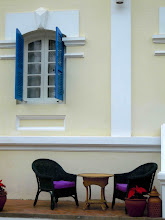Last night, in celebration of finished a horrible biostats test, I went with some friends to the NOLA Healthcare Townhall Meeting - a "candid discussion with industry leaders." The meeting, taking place in one of Tulane's uptown campus buildings, was composed of about 10 healthcare professionals, all with beautiful letters after their names, as if trying to outdo each other. MB.BS, MSW, MD, M.P.A., Ph.D.,... so many letters. There wasn't one RN, community member, or volunteer. The first speaker, who will remain nameless, said that New Orleans healthcare did not suffer from a lack of money but from a lack of resources. He argued for an improvement of the current facilities, making them cutting edge, rather than focusing on primary healthcare. Has the man seen the people who need healthcare?!
While Nola does need to develop its tertiary healthcare system, it needs to start with the basics. How can a truly equal system be constructed without starting from the bottom, building a firm foundation of primary care? Charity Hospital, now closed, provided care to those with no insurance but how many of those problems could have been minimized with primary care months earlier. Many people without health insurance wait until a problem is severe enough to interfere with daily life to do something about it. They have little or no prior relationship with a healthcare worker and often lack the basic foundation of information necessary to make an educated decision. Now, you might be thinking that my comments are derisive and demeaning - that only uneducated people lack health insurance. However, that's not the case. In many places, the majority of uninsured or underinsured are people in their 20s - those who could afford insurance but don't see the necessity of it. In this case, Nola's healthcare problem is not a lack of money. But in many cases, it is. People lack the monetary flexibility to take a day off from work to wait in line at a free clinic to hopefully get an appointment. If they can get an appointment, they can't always make time to fulfill the referrals or they can't afford the recommended treatment. So even while charity clinics are becoming all the rage, they aren't the solution - they're a poor band aid that you hope stops the bleeding.
With 47% of the New Orleans population living under 200% of the poverty line, money is a problem. So how do you change this? Several solutions were proposed. While these solutions are time and money consuming, they may be the only way to help Nola healthcare.
- improve access to TIMELY, QUALITY, AFFORDABLE care;
- increase prevention and wellness events/activities/education - it costs 4-5 times more to cure problems than to prevent them;
- create a safe environment with access to healthy lifestyle choices - when it's cheaper to buy high calorie, low nutrient fast food, it's hard to make healthy lifestyle choices;
- improve and maintain continuity of care - Katrina messed up a lot of people's lives - continuity is critical.
- create a holistic health care system.


No comments:
Post a Comment